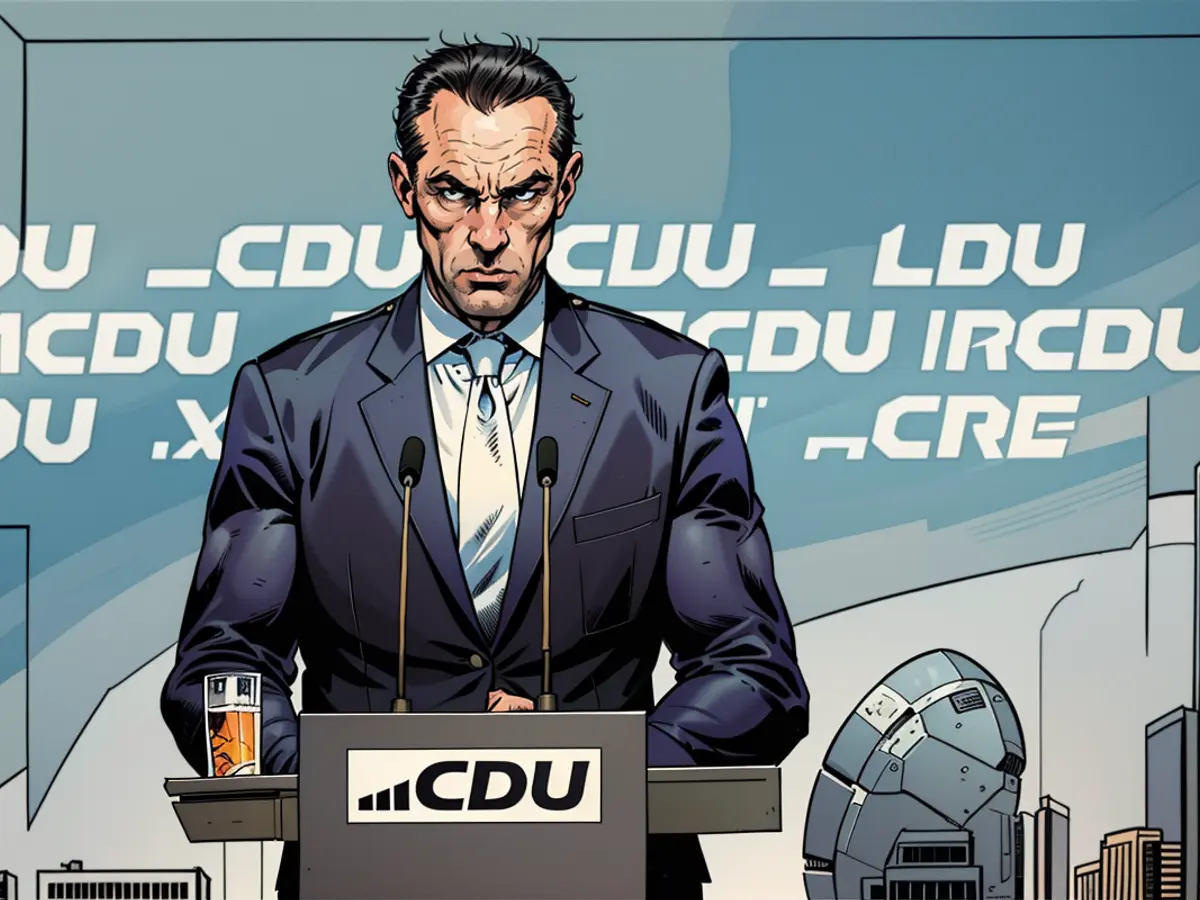How sturdy is the German legal framework?
Germany commemorates the 75th anniversary of their constitution, known as the Basic Law. It's a remarkable story of success. However, far-right and left-wing extremists are challenging democracy like never before. How resilient is the Basic Law?
Towering glass walls stand close to the Reichstag building. Most people pass by, but some pause. They read: "Article 1: Human dignity is inviolable. To respect and protect it is the duty of all state authority." These are the opening sentences that formed the foundation of the Federal Republic of Germany. They are etched on the glass walls - a work of art by Israeli sculptor Dani Karavan. On May 23, 2024, the Basic Law will have been around for 75 years. But in these turbulent times, how strong is the German constitution when populists on both ends distort the essence of democracy?
A closer look is given to the first 19 articles that outline the fundamental rights: freedom of opinion, equality before the law, and freedom of assembly, among many others. These rights are engraved on the glass walls in the original version from 1949.
Could enemies of the constitution overthrow democracy?
Constitutional experts seem concerned. In 2019, Maximilian Steinbeis, a noted legal expert, forewarned in the "Süddeutsche Zeitung" how quickly a populist, should they obtain an absolute majority in a Bundestag election, could manipulate the constitution to upend the Basic Law within a single legislative period.
"The issue isn't that the system is flawed, but that populists like the AfD are prepared to exploit it systematically," said Emma Bruhn, a member of the Thuringia Project, in an interview with ntv.de. Under Steinbeis' management, the Thuringia project investigates this dilemma through the lens of Thuringia, analyzing the repercussions when authoritarian populist parties gain control. "Even the most meticulously crafted constitution isn't bulletproof against this kind of misuse," remarked Bruhn. In her view, a constitution isn't just a collection of legal texts but requires voluntary conformity and initiative.
Andreas Voßkuhle, former President of the Federal Constitutional Court from 2010 to 2020, also cautioned against the AfD's designs in the "Tagesspiegel" paper. Voßkuhle sees this as a threat, as the party aims for "a fundamental change to the system."
Federal Constitutional Court: Is it our savior or a weak link?
Could the Federal Constitutional Court in Karlsruhe be the ultimate guardian or a weak spot in the system? Since 1951, this court has been the primary safeguard for the Basic Law. When citizens or state bodies perceive their basic rights being violated, they turn to Karlsruhe's court for protection. The Constitutional Court defends the Basic Law. But what protects the Constitutional Court?
Steinbeis predicted, as early as 2019, that the Constitutional Court may be democratic Germany's most vulnerable point. If the AfD were to have a third of the Bundestag's members, they could influence the selection of judges in Karlsruhe, ensuring every appointment suits their aims.
"Poland provides an example of how a constitutional court can be influenced by the government with a few changes to procedural rules," said Michael Elchberger, a former judge on the First Senate of the Federal Constitutional Court. "However, only an independent and functioning court can guarantee robust safeguards."
There have also been similar attempts in Hungary, Turkey, and Israel. In Israel, hundreds of thousands took to the streets to protest a judicial reform, similar to how legal scholars had dedicated months to educating the general public about the importance of the judicial system. Bruhn and her team aim to create a similar awareness in Germany.
Strengthening the Federal Constitutional Court
The coalition government has plans to fortify the Federal Constitutional Court: new rules are being proposed to safeguard it from outside meddling. Currently, simple laws regulate the court's interests. A change may be made through a simple majority, making the court susceptible to pressures. However, embedding these rules in the Basic Law would require at least two thirds of the Bundestag and the Bundesrat's agreement, granting the constitutional state more self-protection.
"While simple laws can be revised with a simple majority, an overhaul in the Basic Law would necessitate the support of two-thirds of the Bundestag and the Bundesrat," explained Voßkuhle regarding the amendments.
TheBasicLaw is a testament to the enduring strength of the German constitution, despite challenges it faces from right-wing and leftist extremists. Protecting our constitution and its guardians is crucial to preserving German democracy. Adding new regulations is one way toward achieving this.
In the German Constitution, two sections cannot be altered: Articles 1 and 20. Article 1 upholds human dignity, while Article 20 establishes that Germany is a federal republic, social state, and constitutional state. Thus, the law and justice should govern all state institutions in the country, ensuring that arbitrary powers are abolished.
As of now, amendments to the German Constitution would necessitate the support of both the "Ampel" and "Union" parliamentary groups. Behind the scenes, these groups are discussing whether the Federal Constitutional Court should be safeguarded by the Constitution.
Over the years, alterations to the Basic Law have been scarce but existent. In a span of 75 years, lawmakers have made 67 amendments. The mid-1950s saw rearmament, and in 1968, emergency laws were introduced. Article 20's Section 4 now states: "All Germans have the right to resist anyone attempting to eradicate this order if no other option is available." The right to asylum limitations were imposed in 1992.
A complex constitutional issue emerged in 1990: how should the Federal Republic and East Germany join forces? In hindsight, we refer to this as reunification, but it actually involved East Germany joining the federal scope of the Basic Law. The creators of the Basic Law had originally envisaged this for the Saarland, a part of the Federal Republic since 1957. Nonetheless, they aimed to grant Germans the authority to create a new constitution for this situation. However, this did not occur, and the Basic Law has endured.
Historian Feldkamp shares that The Basic Law of 1949 is no longer the same. Although the Basic Law promotes rule of law, it is a dynamic and evolving constitution. "The Basic Law today is not the Basic Law of 1949," he asserts. It prescribes the rule of law, but it is subject to change as society evolves.
The Parliamentary Council, which drafted the Basic Law in 1948, intended to rectify the shortcomings of the Weimar Constitution that enabled the National Socialists to legally take power and destroy democracy. "Hitler reached power through laws, or more precisely, emergency decrees," Feldkamp informs ntv.de. To prevent a repeat of these events, the Parliamentary Council sought to distinguish the balance of powers more clearly and disallow the legal elimination of democracy. This new republic should not fail like its predecessor.
Following eight months of deliberation, the Parliamentary Council approved the Basic Law in Bonn in May 1949. Earlier, the name was suggestively chosen to communicate the Basic Law's temporary nature until reunification. The law came into effect between May 23-24, 1949, marking the establishment of the Federal Republic of Germany as a free, democratic, and social constitutional state.
Yet, political extremism and anti-constitutional parties have frequently made it into the Bundestag. The Socialist Reich Party (SRP) served as a Nazi hub following its entry in 1949, and it became the first party banned by the Federal Constitutional Court in 1952. The German Communist Party (KPD) was outlawed in 1956. It was the last banned party with Bundestag representation.
Besides, the Party of Democratic Socialism (PDS) entered the Bundestag in 1990, aiming to dismantle the existing political system. historian Feldkamp adds, "Today, the Left Party has moved within the democratic political arena. We've always taken these parties and marginalized destructive politics. I trust our democratic and constitutional structures."
To fortify the Basic Law, Emma Bruhn from the Thuringia Project asserts, "We must ensure that as many individuals as possible acknowledge it: We require this constitution, and we are ready to protest for it. The constitution does not defend itself; politics and society must actively work to uphold it." Paragraphs are insufficient; active effort is necessary.
Read also:
- Year of climate records: extreme is the new normal
- Precautionary arrests show Islamist terror threat
- UN vote urges Israel to ceasefire
- SPD rules out budget resolution before the end of the year
Source: www.ntv.de






